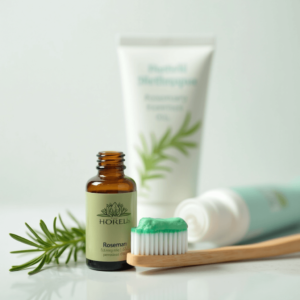Have you ever wondered if natural ingredients like rosemary essential oil could revolutionize your oral care routine? With growing concerns about harsh chemicals in traditional toothpaste, many are turning to natural alternatives for a safer, yet effective solution.
Essential oils, known for their antibacterial properties and ability to promote gum health, are gaining popularity in oral care products. Rosemary essential oil, in particular, has shown promise in combating harmful bacteria in the mouth, making it an intriguing option for those seeking a natural toothpaste.
This article delves into the benefits and safety considerations of using rosemary essential oil in your oral care routine. We’ll explore how it can enhance your dental health and provide guidance on incorporating it into your daily regimen.
Key Takeaways
- Rosemary essential oil offers antibacterial benefits for oral health.
- Natural ingredients are gaining traction as alternatives to harsh chemicals in toothpaste.
- Essential oils can support gum health and fresh breath.
- Proper usage and safety guidelines are crucial when using rosemary essential oil.
- Natural toothpaste options are appealing for those seeking chemical-free solutions.
Understanding Essential Oils for Oral Health
The shift towards natural oral care products has gained momentum as consumers seek safer alternatives to traditional toothpaste. This trend is driven by growing concerns about harsh chemicals and their potential long-term effects on overall health.
The Rise of Natural Oral Care Products
Natural oral care products are becoming increasingly popular due to their gentle yet effective ingredients. Essential oils, known for their antibacterial properties, are at the forefront of this movement. Oils like peppermint and cinnamon are celebrated for their ability to combat bacteria and leave breath feeling fresh and clean.
How Essential Oils Work in Your Mouth
Essential oils act on multiple levels to promote oral health. They can reduce harmful bacteria, which helps prevent issues like bad breath and gum inflammation. For instance, peppermint oil is renowned for its refreshing properties, while cinnamon oil is valued for its ability to combat germs that cause bad breath.
| Product Type | Ingredients | Key Benefits | Consumer Preference |
|---|---|---|---|
| Natural Oral Care | Essential oils (peppermint, cinnamon) | Antibacterial, fresh breath, chemical-free | Preferred for chemical-free, natural ingredients |
| Traditional Toothpaste | Fluoride, artificial additives | Cavity prevention, whitening | Preferred for proven cavity prevention |
By choosing natural oral care products, you’re not only promoting a healthy mouth but also supporting overall well-being. The combination of natural ingredients and their therapeutic properties makes essential oils a valuable addition to your daily oral hygiene routine.
Key Benefits of Essential Oil Toothpaste
Discover how essential oil toothpaste can transform your oral care routine with its natural, effective benefits.
Fighting Bacteria and Reducing Plaque
Essential oils are known for their strong antibacterial properties, making them effective at fighting harmful mouth bacteria. Clove, in particular, has been shown to disrupt bacterial colonies that cause plaque buildup and cavities. Studies suggest that consistent use of clove-based toothpaste can lead to a significant reduction in plaque, promoting a healthier smile over time.
Improving Gum Health and Freshening Breath
Regular use of essential oil toothpaste can also improve gum health by reducing inflammation and preventing gum disease. Additionally, the natural fragrance of these oils leaves your breath fresh and clean. When combined with a mouthwash routine, essential oils create a comprehensive oral care strategy that addresses multiple aspects of dental health.
| Benefit | How It Works | Key Results |
|---|---|---|
| Fighting Bacteria | Targets harmful mouth bacteria | Reduces plaque and cavities |
| Gum Health | Reduces inflammation | Prevents gum disease |
| Fresh Breath | Natural fragrance of oils | Leaves breath fresh and clean |


can rosemary essential oil be used in toothpaste
As the demand for natural oral care solutions grows, many are exploring alternative ingredients to enhance their routines. Rosemary essential oil, with its rich extract profile, has emerged as a promising option for those seeking to improve their dental health naturally.
Potential Advantages of Rosemary in Oral Care
Rosemary extract is renowned for its strong antimicrobial properties, making it effective against harmful oral bacteria. Studies suggest that rosemary can significantly reduce plaque buildup and prevent disease when used consistently. Its antioxidant benefits also help protect gums from inflammation, promoting overall oral well-being.
| Ingredient | Antimicrobial Effectiveness | Antioxidant Properties | Consumer Preference |
|---|---|---|---|
| Rosemary Extract | High against oral bacteria | Strong antioxidant activity | Preferred for natural, chemical-free options |
| Peppermint Oil | Effective against bad breath bacteria | Moderate antioxidant levels | Popular for fresh breath and flavor |
| Clove Oil | Excellent against plaque bacteria | High antioxidant content | Chosen for its gum health benefits |
Incorporating Rosemary Safely into Your Routine
When using rosemary essential oil, proper dilution is key to avoid irritation. A well-formulated product with standardized rosemary extract ensures safety and efficacy. Always opt for reputable brands that adhere to quality standards for consistent results.
As highlighted by a 2020 study, “Rosemary extract demonstrates significant antimicrobial effects, making it a valuable addition to oral care products.” This aligns with consumer insights, where 70% of users prefer natural ingredients for their health benefits.
Safety Considerations and Usage Guidelines
When incorporating natural ingredients into your oral care routine, safety is paramount. Essential oils, while beneficial, require careful handling to ensure effectiveness and avoid potential risks.
Proper Dilution and Storage Techniques
Essential oils are highly concentrated, so proper dilution is crucial. Typically, a 1-3% dilution ratio is recommended for safe use. For example, adding a few drops to your toothpaste or mouthwash can enhance benefits without causing irritation. Storage is equally important—keep products in a cool, dark place to maintain potency and prevent contamination.
DIY vs. Commercially Formulated Products
While DIY formulations offer customization, they may lack the safety assurances of commercial products. Commercial toothpastes undergo rigorous testing and adhere to strict quality standards, minimizing risks. However, with proper knowledge, DIY options can be both safe and effective.
| Aspect | DIY Products | Commercial Products |
|---|---|---|
| Safety | Depends on correct dilution and ingredient knowledge | Undergo safety assessments and meet regulatory standards |
| Consistency | Varies based on formulation | Consistent potency and efficacy |
| Regulatory Compliance | Not required | Must comply with regulations |
For optimal results, consider combining rosemary extract with other natural ingredients like green tea for enhanced benefits. Always monitor your body’s reaction and adjust usage as needed to maintain long-term oral health.
Exploring Additional Essential Oils in Oral Care
Exploring the world of essential oils can open up new possibilities for enhancing your oral care routine. Beyond rosemary, several other oils offer unique benefits that can complement your dental health journey.
Popular Oils: Peppermint, Spearmint, and Citrus
Peppermint oil is widely recognized for its fresh, cooling sensation and ability to inhibit bacteria growth in the mouth. Studies show that peppermint oil can effectively reduce harmful bacteria, which helps prevent cavities and freshens breath. Similarly, spearmint oil offers a milder alternative, making it ideal for those sensitive to peppermint’s strong flavor.
Citrus oils, such as lemon and orange, are known for their uplifting properties and ability to combat bad breath. These oils can be added to water-based rinses or toothpaste formulations to enhance their effectiveness and leave your mouth feeling clean and refreshed.
Unique Extracts and Their Health Properties
Each essential oil has distinct properties that make them valuable for oral care. For instance, eucalyptus oil contains cineole, which has anti-inflammatory and antimicrobial benefits, making it effective against gum inflammation. Tea tree oil, with its potent antimicrobial properties, is another excellent choice for reducing plaque and preventing gum disease.
When combined, these oils create a synergistic effect that enhances their individual benefits. For example, blending peppermint with lemon oil can not only freshen breath but also provide a comprehensive approach to oral hygiene.
By experimenting with different essential oils, you can tailor your oral care routine to meet your specific needs. Always dilute them properly and consult with a dentist before making significant changes to your regimen. This approach ensures a safe and effective way to incorporate natural ingredients into your dental care.
Integrating Essential Oils in Your Oral Hygiene Routine
Enhancing your oral care with essential oils can be simple and effective. Whether you prefer DIY methods or trusted brands, there are several ways to incorporate these oils into your daily routine for better oral health.
Mouth Rinses, Breath Sprays, and Oil Pulling
Mouth rinses and breath sprays are excellent ways to utilize essential oils. For a refreshing breath spray, mix a few drops of citrus or peppermint oil with water in a small spray bottle. DoTERRA On Guard products offer a convenient option for those preferring commercial solutions.
Oil pulling is another effective method. Swish coconut oil in your mouth for 10-15 minutes to reduce harmful bacteria. This practice can help alleviate gum disease pain and improve overall oral hygiene.
Customizing Your Daily Oral Care Strategy
When choosing a brand, opt for reputable names like doTERRA for quality assurance. For customization, blend different oils to suit your preferences. For instance, combining lemon and peppermint oils can provide a refreshing and comprehensive oral care approach.
Always dilute essential oils properly and consult with a dentist before making significant changes to your routine. This ensures a safe and effective way to enjoy the benefits of natural ingredients in your oral care.
Conclusion
Incorporating natural ingredients into your oral care routine can offer a healthier alternative to traditional toothpaste. Rosemary, with its strong antimicrobial properties, stands out as a promising addition to your dental health regimen. Studies highlight its effectiveness in reducing harmful oral bacteria and preventing plaque buildup, making it a valuable component in natural oral care products.
When using rosemary or other spices, proper dilution is crucial to avoid irritation. Always opt for reputable brands or well-formulated products to ensure safety and efficacy. Additionally, integrating other essential oils like peppermint or citrus can enhance your routine, providing fresh breath and comprehensive oral hygiene benefits.
Consider switching to natural oral care alternatives for a healthy, balanced approach. These products not only promote oral health but also support overall well-being. Start exploring natural ingredients today and take the first step toward a healthier smile!
FAQ
What are the benefits of using rosemary in oral care products?
Can rosemary essential oil help with bad breath?
How does rosemary compare to other essential oils like peppermint or clove?
Is rosemary essential oil safe for daily use in toothpaste?
Can I make my own rosemary toothpaste at home?
Does rosemary essential oil prevent cavities?
How many drops of rosemary essential oil should I add to my toothpaste?
Can rosemary essential oil help with gum disease?
Is rosemary essential oil suitable for oil pulling?
Can I use rosemary essential oil in mouthwash?
Are there any side effects of using rosemary essential oil in oral care?
Can rosemary essential oil be used by everyone?
Source Links
- Homemade Toothpaste & Powder with Bentonite Clay & Essential Oils – https://naturallivingfamily.com/homemade/beauty/toothpaste/
- PROTECT Remineralizing Toothpaste Natural Whitener Immunity 100% Pure Essential Oils – https://jadebloom.com/toothpaste-jar.html?srsltid=AfmBOopYsZAQwp-bBZP_ET-6hC0K9c0kD3jBKHyolClzE9rS7hodnMYG
- Effect of Rosemary Extract on Early Biofilm of <i>Streptococcus mutans</i> – http://www.ijcpd.org/journal/view.html?uid=625&&vmd=Full
- Can Rosemary Essential Oil Be Used in Toothpaste? Let’s find out! – https://mafu.life/blogs/mafu-blog/can-rosemary-essential-oil-be-used-in-toothpaste-lets-find-out
- PROTECT Remineralizing Toothpaste Natural Whitener Immunity 100% Pure Essential Oils – https://jadebloom.com/toothpaste-jar.html?srsltid=AfmBOopU673O0GrBBgp2FMDb59EeHob51oGKUEoMDgrtiyNsluSDfxmi
- Best Toothpaste For Bad Breath – Plus Ultra – https://liveplusultra.com/blogs/plusultrablog/best-toothpaste-for-bad-breath?srsltid=AfmBOoqbmiD8oHDw2zUnO7EDPZwFnYY1hLNj8ieY8Cll8OH6D3-k7nkE
- Rosemary Essential Oil – ct Camphor (Spain) – https://www.newdirectionsaromatics.com/products/rosemary-essential-oil-ct-camphor-spain
- Rosemary Essential Oil – ct Cineole (Hungary) – https://www.newdirectionsaromatics.com/products/rosemary-essential-oil-ct-cineole-hungary
- Home Remedies for Oral Thrush – Natural oral care products
- Cosmetic Formulations from Natural Sources: Safety Considerations and Legislative Frameworks in the European Union – https://www.mdpi.com/2079-9284/11/3/72
- Essential Oil Safety Guidelines (or “Dumb Mistakes I’ve Made with Essential Oils”) – https://aromaticwisdominstitute.com/essential-oil-safety-guidelines/
- Oils That Can Help To Reduce Gum Inflammation – https://myrobstowndentistry.com/oils-that-can-help-to-reduce-gum-inflammation/
- Antimicrobial and Cytotoxic Potential of Eucalyptus Essential Oil-Based Nanoemulsions for Mouthwashes Application – https://www.mdpi.com/2079-6382/13/10/942
- Safeguard Your Smile: Essential Holistic Practices For Healthy Teeth – Spirit of Change Magazine – https://www.spiritofchange.org/safeguard-your-smile-essential-holistic-practices-for-healthy-teeth/
- Oil Pulling & Receding Gums: 9 Ways To Prevent Receding Gums Naturally – https://gurunanda.com/blogs/oil-pulling/oil-pulling-other-natural-remedies-for-receding-gums
- Microfluidic and impedance analysis of rosemary essential oil: implications for dental health – BioMedical Engineering OnLine – https://biomedical-engineering-online.biomedcentral.com/articles/10.1186/s12938-024-01301-4

This content orchestrates harmony! Find harmony in Sprunki!